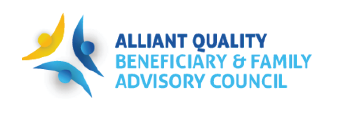|
|
|
|
Please share this email with friends or colleagues using these links:           
(Please do not forward the email as it may impact your subscription settings)
|
|
A monthly newsletter highlighting events and resources for Nursing Homes & Community Coalitions
In This Issue:
|

CMS and CDC Take Additional Action to Protect Nursing Home Residents from COVID-19
The Centers for Medicare & Medicaid Services (CMS), in collaboration with the Centers for Disease Control and Prevention (CDC), is developing an emergency regulation requiring staff vaccinations within the nation’s more than 15,000 Medicare and Medicaid-participating nursing homes. Read the Article
CMS Expands Medicare Payments for At-Home COVID-19 Vaccinations
As part of the Biden-Harris Administration’s ongoing commitment to increasing access to vaccinations and improving health equity, the CMS is expanding opportunities for people to receive COVID-19 vaccinations in their home. To ensure Medicare beneficiaries who have difficulty leaving their homes or are otherwise hard-to-reach can receive the vaccination, healthcare providers can now receive additional payments for administering vaccines to multiple residents in one home setting or communal setting of a home. Read More
|
|
|
|
Our team is collecting and curating the essential trainings, events, resources, and vaccine updates about COVID-19 on our website so you can visit one page to find the information you need. We've also outlined the essentials below.
View All COVID-19 News & Resources
Training & Resources
Free COVID-19 Training: User Guide and Kudos KitThe “Centers for Medicare & Medicaid Services (CMS) Targeted COVID-19 Training for Frontline Nursing Home Staff and Management” is a great resource for nursing home staff to put the latest information regarding infection control, COVID-19 preparedness, resident-centered care, vaccine distribution and other important topics into practice. These resources were designed to help nursing home teams access the free, on-demand trainings and celebrate the staff who complete them. Materials include:
- A user guide that contains everything a nursing home needs to access and complete the training. The user guide (also available in Spanish) walks you through a pre-training checklist, registration, course selection, contacts and more.
- A kudos kit that contains social media messages and graphics, a press release template, printable graphics and more to acknowledge the hard work and dedication of staff who take the critical step to complete the trainings. These items will help nursing home teams celebrate their accomplishments internally, while also promoting them to families and community members, social media followers and local media.
Download User Guide | Download Kudos Kit
Should You Wear a Mask Indoors? Check the MapWith the COVID-19 delta variant impacting much of the United States, the federal government updated its masking guidelines for fully vaccinated people. The new advice is to wear a mask indoors if you live in a place with substantial or high coronavirus transmission. The guidance for people who are unvaccinated remains the same: Always wear a mask indoors in public places. So, what's the level of transmission where you live? Check out this map and share it with patients, caregivers, colleagues and relatives.
American Indian Alaska Native Tribal Leaders COVID-19 Toolkit
The American Indian Alaska Native (AIAN) Tribal Leaders Toolkit has resources for AIAN tribal leaders who want to help increase confidence in and uptake of COVID-19 vaccines in their communities. It includes information from the CDC and new, culturally-tailored materials prepared by a team of multicultural experts. Access the Toolkit
- COVID-19 Vaccine Booster Shots - The U.S. Department of Health and Human Services (HHS) announced plans to begin offering COVID-19 booster shots in the fall. Read the Article
- Interim Public Health Recommendations for Fully Vaccinated People – Summary of Recent Changes (Updated information for fully vaccinated people based on new evidence on the Delta variant) View Recommendations
- When You've Been Fully Vaccinated: How to Protect Yourself and Others View CDC.gov
- CDC Vaccine Finder Download Flyer | Visit VaccineFinder.org
- CDC Community Guide on Increasing Vaccine Uptake in Racial & Ethnic Minority Communities View Guide
- CDC Best Practice Guide on COVID-19 Vaccine Equity for Community & Faith Based Organizations View Guide
- CDC Ranks States by COVID-19 Vaccines Administered View Daily Data Tracker
Immunization Action Coalition Offers Weekly News and Updates The Immunization Action Coalition (IAC) provides information, updates and resources for vaccinators. Their newsletter includes new and updated vaccine information sheets in 14 languages. View the IAC August Newsletter
Immunocompromised Medicare Patients Can Receive an Additional COVID-19 Dose at No Cost
In response to the Food and Drug Administration’s (FDA) recent action that authorizes an additional dose of the COVID-19 vaccine for immunocompromised individuals, CMS is assuring people with Medicare who qualify for an additional dose that they can receive it at no cost. Medicare will pay for administering an additional dose of COVID-19 vaccines consistent with the modified FDA emergency use authorization announced in August. View the FDA Announcement | CMS COVID-19 Provider Toolkit
New Legislation Proposed for Immunization Outreach, Education and Support
The U.S. House of Representatives Energy and Commerce Committee unanimously passed H.R. 550, the Immunization Infrastructure Modernization Act. The bill provides $400 million for grants to expand, enhance and improve immunization information systems. It directs the HHS to develop a strategy to improve immunization information systems, designate data and technology standards for the systems, and award grants to health departments and government organizations to bring their systems up to these standards. It also requires the HHS to issue a report on the barriers health departments face in implementing interoperable immunization information systems; the exchange of information, reporting and monitoring; and an assessment of immunization coverage and access, including any disparities or gaps. This bill also requires the CDC to provide technical assistance to healthcare providers and adds scheduling and administration of vaccinations as an allowable use of grant funds.
COVID-19 Self-Management Zone Tool Provides Patients With Reassurance and Reduces Risk of Readmission
Ascension Sacred Heart and Ascension St. Vincent’s, along with other Ascension health system hospitals and free-standing Emergency Rooms in the Florida panhandle and east coast regions, have shared their best practice use of the COVID-19 Self-Management Zone Tool as part of their COVID Safe At Home initiative, which they describe as a “life-line to our patients who are scared and fearful in the community battling COVID-19.”
The zone tool, also referred to as a stop light tool, is part of the discharge plan for patients presenting to Emergency Departments that are COVID positive, do not need an acute level of care and do need reassurance. Patients are discharged to home with a pulse oximetry unit, CDC guidelines and the COVID-19 Self-Management Zone (stop light) tool. Patients receive instructions on how to use a pulse oximetry unit and to compare their pulse oximetry measures to the green, yellow and red zones. Members of the COVID Safe at Home team conduct follow-up calls post discharge and talk through the zone supplementing the education provided in the ED. Patients whose pulse oximetry measures fall within the green zone are then guided on continued monitoring and advised to call if they feel they are in the yellow zone. Yellow zone patients receive calls every couple of hours until they improve and are in the green zone or decline and fall into the red zone. The COVID-19 Self-Management Zone tool is currently used in the Florida panhandle area with expansion this month into Alabama.
For more information on this best practice or the planned expansion of this tool to the inpatient setting, contact Sheila Richards, RN, BSN, MBA, Care Excellence Manager, Population Health, Ascension Sacred Heart Pensacola at Sheila.Richards@ascension.org or Kimberly Lewis, RN, BSN, Director of Quality and Patient Safety Ascension Florida Gulf Coast at Kimberly.Lewis@ascension.org. The COVID-19 Self-Management Zone Tool can be found on the Alliant Quality website in both English and Spanish at COVID-19 Self-Management Zone Tool.
We Can Do This: HHS Campaign to Increase COVID-19 Vaccine Confidence
The U.S. Department of Health and Human Services created a nationwide COVID-19 public education campaign to increase public confidence and uptake in COVID-19 vaccines while reinforcing basic prevention measures such as wearing masks and social distancing. Through consistent, fact-based public health messaging, the campaign helps the public make informed decisions about their health and COVID-19, including steps to protect themselves and their communities. The public education activities are organized around three themes:
- Slow the Spread: Basic prevention measures that should be taken while waiting for the vaccine
- Building Vaccine Confidence: Information and resources to build vaccine confidence, timed to support action when vaccines are available
- Preparing the Nation: Fact-based, scientific information about vaccine development, safety, and effectiveness
Download Campaign Resources and Toolkits
|
|
|
Leadership Lessons
Words of advice from leaders on the front lines.
This month’s leadership lesson is from Carolyn Kazdan, Community Coalitions and Nursing Homes Aim Lead at Alliant Quality.
How to Heal From Trauma and Reconnect With Joy
Hockey great Wayne Gretzky is often quoted as saying, “I skate to where the puck is going to be, not where it has been.” As healthcare leaders, we are skating towards a future in which our teams have healed from the trauma of the COVID-19 pandemic. We are striving to strengthen our cultures and the resiliency of our workforce.
To do this, we need to practice self-care and ensure that we take steps to deal with our COVID-19-related trauma and reconnect with the joys and rewards of career and life. In their book “Why Cope When You Can Heal?: How Healthcare Heroes of COVID-19 Can Recover from PTSD,” authors Mark Goulston and Diana Hendel share strategies for wellness toolboxes, including:
- Instant relaxation techniques
- Calming affirmations
- Anchors
- Brightening someone’s day
- Talking about the trauma
For more information on how leaders can cope with and heal from organizational and personal trauma, listen to Quint Studer’s interview with Diana Hendel on his Busy Leader’s Podcast, episode 6, November 2020.
Read on our Website
Best Practice Corner
Each month Alliant Quality collects exemplar practices from organizations across the seven-state region. Thank you for your leadership, creativity, and perseverance.
How One Alabama Resident Got 94% of Her Town Vaccinated
With the closest clinic in her community being 30 miles away, Dorothy Oliver, of Panola, Ala., organized a pop-up vaccination clinic in her town of 146 people. Panola now has a 94% vaccination rate. Read More
Kentucky Requiring Masks, Encouraging Vaccinations at State-Run Health Care Facilities
Last month, the state of Kentucky began requiring universal masking in all state-run health care facilities, including veterans nursing homes. In addition, all contractors and state employees working in state-operated facilities are strongly encouraged to be fully vaccinated against COVID-19 by October 1. Unvaccinated staff will be tested at least twice weekly for their safety and the safety of the patients they serve. Read More
Georgia Extends its GeorgiaCARES Grant Program through October
Georgia Gov. Brian Kemp approved to extend the GeorgiaCARES Grant Program to assist nursing centers with the cost of mandatory staff testing requirements incurred between July 1 to October 31. For questions regarding the grant extension, email grants@opb.georgia.gov.
Nashville’s “Refer to Win” Campaign Offers Incentives for Encouraging Vaccination
The mayor of Nashville, Tenn. launched a “Refer to Win” vaccination campaign to incentivize residents to refer their family, friends, neighbors and coworkers to get the COVID-19 vaccination. Nashville residents can win one of 20 different prizes by referring friends and family to get vaccinated. Read More
Do you have a promising practice to share? Please reply to this email and we will feature you in an upcoming issue.
|
AHSCAST - Making Health Care Better
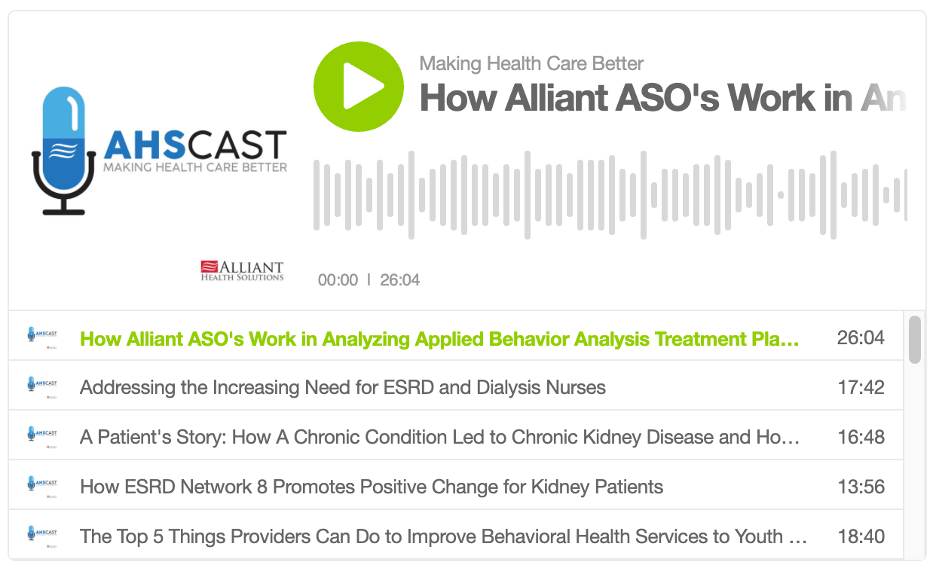 |
Everyone deserves quality health care.
Tune into the Alliant Health Solutions Making Health Care Better podcast every other Thursday as they interview guests committed to making health care better. If you are a health care consumer, provider, insurer, system, or consultant, this is the podcast for you. View All Podcast Episodes |
|
Events
|
Upcoming Learning & Action Network (LAN) Events
-
Nursing Homes: Best Practices for Surveillance, Diagnosis and Treatment of C. Difficile
Tuesday, September 21 at 2 p.m. ET / 1 p.m. CT (30 min.)
C. difficile is a common cause of healthcare-associated infection. In this session, participants will learn about diagnostic stewardship interventions that decrease antimicrobial use and C. difficile infection rates.
Register Now | View Agenda
-
Community Coalitions: Care Planning for Successful Transitions During COVID-19
Thursday, September 23 at 12:30 p.m. ET / 11:30 a.m. CT (30 min.)
Care transitions are when hospitalized older adults are vulnerable to poor clinical outcomes such as medication errors, readmission, or even death. Well-executed care transitions incorporate effective communication and shared decision-making between patients, care partners and providers, along with accurate medication reconciliation, planned follow-up, and education on reportable signs and symptoms of clinical changes. In this presentation, we will discuss COVID-19's impact on the delivery of effective transitional care and troubleshoot potential solutions to address these care barriers.
Register Now | View Agenda
Register for Upcoming LAN Events
Last Month's Learning & Action Network (LAN) Events
- Nursing Homes: QI Tactics for Increasing & Documenting Short Stay Vaccination Rates
Recorded on August 17, 2021
View Slides
- Community Coalitions: “Daunting”– Discharge Experience Perspectives from Older Adults with Diabetes
Recorded on August 26, 2021
View Recording | View Slides
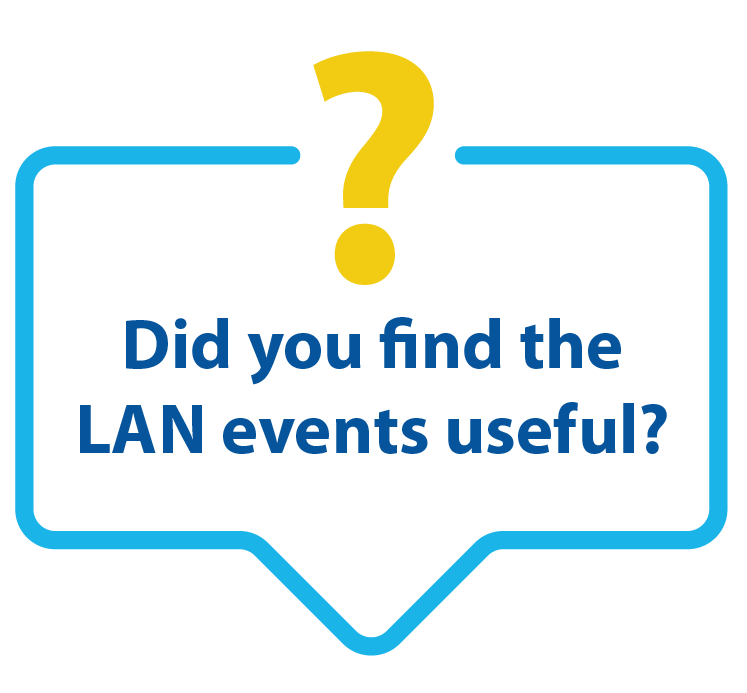
Were You Able to "Use Tomorrow" What You Heard During the LAN Events?
If Yes, Click Below.
Nursing Homes LAN Attendees: Click here
Community Coalition LAN Attendees: Click here
Previous COVID-19 Event
Upcoming Infection Prevention Shop Talks
- September 2021 Shop Talk Call
Thursday, September 16 at 2 p.m. ET / 1 p.m. CT (60 min.)
Join the Alliant Quality Patient Safety Team to get updates on the NHSN system & CMS requirements. We will conduct a live question and answer session to help with your immediate needs in accessing, reporting, and improving data accuracy. Submitting data accurately into NHSN will help you more confidently plan your quality improvement initiatives and respond to surveyor questions.
Register Now
|
Resources
|
|
Celebrating and Supporting Individuals in Recovery: September is National Recovery Month
September is National Recovery Month. This year’s theme is “Recovery is For Everyone: Every Person, Every Family, Every Community” to remind people in recovery and those who support them that no one is alone in the journey through recovery.
The 2021 Recovery Month 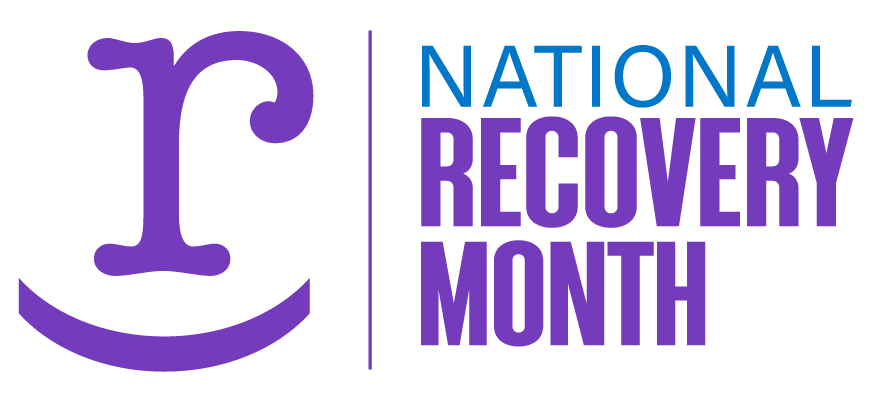 observance will work to promote and support new evidence-based treatment and recovery practices, the emergence of a strong and proud recovery community, and the dedication of service providers and community members across the nation who make recovery in all its forms possible. Click on this link for the full article to learn more. observance will work to promote and support new evidence-based treatment and recovery practices, the emergence of a strong and proud recovery community, and the dedication of service providers and community members across the nation who make recovery in all its forms possible. Click on this link for the full article to learn more.
One evidenced-based treatment approach for substance use disorder (SUD) is Medication-Assisted Treatment (MAT). The ultimate goal of MAT is full recovery, including the ability to live a self-directed life. This treatment approach has been shown to:
- Improve patient survival
- Increase retention in treatment
- Decrease illicit opiate use and other criminal activity among people with substance use disorders
- Increase patients’ ability to gain and maintain employment
- Improve birth outcomes among women who have substance use disorders and are pregnant
Research also shows that these medications and therapies can lower a person’s risk of contracting HIV or hepatitis C by reducing the potential for relapse. Substance Abuse and Mental Health Services Administration (SAMHSA) explains what MAT is and how it is effective in this post.
During this time of surging COVID numbers, substance use and overdoses are surging as well. You may be familiar with telehealth but unsure of how to use it to treat SUDs. Find out more here with SAMHSA’s digital download. It explores barriers to treatment, stigma associated with treatment and competing priorities of everyday life.
|
|
FDA Recalls N95 Respirators Manufactured by Shanghai Dasheng
The FDA is alerting health care facility risk managers, procurement staff and health care personnel to stop using certain N95 respirators manufactured by Shanghai Dasheng Health Products Manufacturing Co., Ltd. (Shanghai Dasheng). The CDC’s National Institute for Occupational Safety and Health (NIOSH) revoked all respirator approvals issued to Shanghai Dasheng because the company did not implement, maintain and control a quality management system. All previously authorized Shanghai Dasheng respirators are no longer authorized for emergency use as a result of the loss of NIOSH-approval. Read More
National Healthcare Safety Network Training
The CDC offers learning opportunities in various formats to enhance the knowledge and skills of National Healthcare Safety Network (NHSN) facility- and group-level participants and their partners so they can effectively use the data from the surveillance system to improve patient and health care personnel safety. The NHSN Educational Roadmaps provide a guided tour of the training materials and information needed for a solid foundation of NHSN—from the basics to more advanced training for each individual component or protocol. Continuing education is also available.
Alliant Essential Communication Elements Toolkit
Adverse drugs events (ADE) are a major contributor to preventable hospitalizations and emergency department visits. This toolkit identifies the fundamental provider communication criteria necessary for the safe transition of care for patients receiving pain medication, anticoagulants and diabetes medications. Additionally, it can be used to evaluate your facility’s practices regarding communication of requisite pain‐related elements to subsequent providers and identify opportunities for system improvements. View the Toolkit
Invest in Trust: A Resource for Building COVID-19 Vaccine Trust Among CNAs
Despite their role in caring for people in settings that have seen high rates of COVID-19 and their front-of-the-line access to COVID-19 vaccines, some of the essential people in nursing homes—certified nursing assistants (CNAs)—have expressed concerns about getting vaccinated. There is no single solution to this challenge because the reasons are varied, complex and not specific to any one demographic. The Agency for Healthcare Research and Quality created a guide to help nursing home administrators build trust in the COVID-19 vaccines among CNAs and overcome barriers that may make getting the vaccines especially challenging. Download the Guide

|
Essential Resources to Help You Navigate NHSN
Update: Weekly COVID-19 Vaccination Data Reporting & Training
Beginning August 23, report healthcare personnel and residents who are eligible to receive the COVID-19 booster (additional vaccine).
Training slides (reference slides 9 & 20-23)
Who is eligible for the booster? Reference the CDC website for current considerations for use of an additional COVID-19 dose.
Watch Our NHSN Shop Talk Shorts Series!
We know you're busy. Our new video series answers the most common questions we receive regarding navigating NHSN in a brief way. Available videos cover the following topics:
View NHSN Shop Talk Video Series
|
 |
Access FREE expert guidance on this topic: Contact Melody Brown |
|
|
Learning Series Focuses on Cardiovascular Disease Prevention and Management
The National Association of Community Health Centers and Million Hearts host a Learning Lab series with initiatives, resources and education around heart health improvement, including cholesterol control and self-monitoring hypertension. View the Series Schedule
Chronic Kidney Disease (CKD) Prevention and Awareness Resources
Help spread awareness to encourage improved screening of high-risk patients for chronic kidney disease (CKD). We have customized primary care/provider awareness flyers for each state with data on screening beneficiaries with diabetes and hypertension in each state and resources to identify, test and stage for CKD. View CKD Webpage | Download New CKD Screening Awareness Flyers
Hypertension: The No. 1 Co-Occurring Condition with COVID-19 for Hospitalizations
Many patients haven’t yet returned to their doctor for a wellness visit or screening and may have fallen out of touch. Now is a great time to reach out to patients and bring them back in for a full, in-person medical review. More importantly, people are still getting COVID-19 and those with chronic conditions, especially hypertension, have less than positive outcomes. Watch this Hi-Bridge Solutions archived webinar on utilizing electronic health records (EHRs) to identify patients with unaddressed hypertension. Proactive interventions can impact your quality and cost measures if you participate in CMS incentive programs. More importantly, they can help patients maintain their quality of life. Join the discussion on maximizing the data available from EHRs to advance proactive patient engagement. Watch the Webinar
|
Engaging Patient and Family Advisors and Patient Advocates in Quality Improvement Work: Tips for Locating Advisors and Advocates in Your Community
During a recent Care Transitions sharing session, an Alliant Quality Beneficiary Family Advisor and a Patient Advocate member of the Greater Orlando Community Coalition shared tips for identifying potential advisors and advocates to join community coalitions and lend their experience and perspective to improve health care in the communities we serve. Websites that have search features for patient advocates by location include:
Local organizations that are often helpful in either serving or connecting you to potential advisors include Parish Nurses, large employers or retiree groups, Police, Fire Department, EMS providers, Lions Clubs, women’s clubs, United Way, Hospital Patient and Family Advisory Councils, Meals on Wheels providers, Senior Centers and organizations providing guardianship services.
Invite a Patient and Family Advisor and a Patient Advocate to join your coalition and see the impact of including the voice of the customer in your coalition’s work.
Free Emergency Preparedness Materials for Community Coalitions
The National Preparedness Month webpage has free, downloadable resources to share with your communities through your community coalitions. In addition, the Administration for Community Living (ACL) has related emergency prepared resources available for download, including a Communication Assistance Card to help first responders assist someone whose disability may make it difficult for them to communicate their needs. ACL’s full menu of emergency preparedness materials can be found here.
“Daunting”- Discharge Experience Perspectives from Older Adults with Diabetes
During our August Community Coalition LAN event, Dr. Jacqueline LaManna shared information gleaned from interviewing 60-70 newly discharged patients and family members. Dr. LaManna referenced several tools that can help hospital and post-acute care providers assess post-discharge coping difficulties and the quality of discharge teaching. Dr. LaManna noted that coping difficulties could increase over time as caregivers leave or reduce their time engaged with a discharged patient, or a patient becomes discouraged with a lack of progress returning to a prior level of functioning.
Post Discharge Coping Difficulties - This scale is typically administered by phone two to three weeks post-discharge to assess coping difficulties at home following discharge from the hospital. The post-difficulty scale is available in English and several other languages with links to interpreters. This tool can help identify if readmission risks remain and should be addressed by adjusting of a care plan or referral to the patient’s post-acute care provider.
Quality of Discharge Teaching Scale - This scale is available in English and other languages. For this scale, patients are asked to reflect on the teaching they received from their nurses during hospitalization, based on an underlying assumption that discharge teaching occurs throughout the hospitalization. It’s not intended to measure teaching by one specific nurse, but whether the patient received adequate content from nurses and whether the nurses exhibited high-quality discharge teaching skills.
The permission to use and conditions statement can be found here.
National COVID-19 Resiliency Network (NCRN)
Want COVID-19 information and resources at your fingertips? Download the National COVID-19 Resiliency Network (NCRN) mobile app.
If you prefer to speak to someone directly, contact the NCRN call center at 1-877-904-5097. Operators are available between 9 a.m-9 p.m. Monday-Friday.
 |
Access FREE expert guidance on this topic: Contact Carolyn Kazdan |
|
End of Life Issues and Palliative/Hospice Care in Dementia
The KEEN-CDC Project (The Kentucky Enduring Education and Care Network for Collaborative Dementia Care) is offering a free live Zoom event for all long-term care staff and medical providers in the United States.
The event will be held on September 7 from 3-4:30 p.m. EST. The speakers for this program are Dr. Jessica McFarlin, MD, Chief of Palliative and Supportive Care, UK HealthCare and Dr. Gregory Jicha, MD Ph.D., Clinical Core Leader, Sanders-Brown Center on Aging, Alzheimer’s Disease Center, University of Kentucky.
By the end of this event, participants will be able to:
-
Describe appropriate identification of conditions that warrant transition to palliative/hospice care models in residents of long-term care facilities.
-
Discuss palliative/hospice care strategies to improve quality of life & reduce caregiver burden in the end stage of life in subjects with and without appreciable dementia.
Registration is required. It is necessary for everyone viewing the activity (even if using the same device) to register individually. A Zoom confirmation email will be sent to everyone that registers. Register Here
OSHA COVID-19 Healthcare ETS (Emergency Temporary Standard)
The August update states: “To assess the ongoing need for an Emergency Temporary Standard for healthcare and related industries, the Occupational Safety and Health Administration (OSHA) has reviewed the latest guidance, science and data on COVID-19 and has consulted with the Centers for Disease Control and Prevention (CDC) (through the National Institute for Occupational Safety and Health (NIOSH)). OSHA has determined that CDC’s guidance on healthcare settings has not changed and that the requirements of the healthcare ETS released on June 10, 2021, remain necessary to address the grave danger of COVID-19 in healthcare. OSHA will continue to monitor and assess the need for changes in the healthcare ETS each month.” Read More
Reducing Readmissions and Emergency Department Transfers
“Go to The Hospital or Stay Here? A Decision Guide for Residents, Their Families, Friends, and Caregivers” is a CMS-funded, free decision guide for use with patients, residents, families and health care agents when changes in condition occur in a skilled nursing facility or other post-acute care setting. The guide helps educate families on the risks and benefits of transfer to the Emergency Department or hospital, guides discussions on facility capabilities and provides information on how patients and their care partners can be involved in the decision process. The guide is available in multiple languages and audible formats. In addition, the website has a library of educational tools and resources for the implementation of the guide include written case studies and short videos. Visit the Site
|
Members of the Beneficiary & Family Advisory Council are our partners in making healthcare better. To join us in this important work, contact Mel Brown or submit this referral form.
Browse resources our council has worked on below:
Staying Safe in the Heat: How to Prevent Heat-Related Illnesses
Heat-related illnesses are preventable. Learn the symptoms and what to do if you or a loved one shows signs of having a heat-related illness. It’s especially important to be vigilant of heat-related health problems for people aged 65 or older. If you’re an older adult or a caretaker, learn how you or the person you’re caring for can stay safe during the heat. Learn the Warning Signs of Heat-Related Illness | Learn about Heat Stress in Older Adults
Home Safety and Alzheimer’s Disease
Over time, people with Alzheimer’s disease may become less able to manage around the house. While some Alzheimer’s behaviors can be managed medically, many, such as wandering and agitation, cannot. It is more effective to change the person’s surroundings—for example, to remove dangerous items—than to try to change behaviors. Changing the home environment can give the person more freedom to move around independently and safely. The National Institute on Aging’s Alzheimer's and related Dementias Education and Referral (ADEAR) Center offers free information about Alzheimer’s and related dementias for families, caregivers and health professionals. Visit the Site
|
 |
For more information about Alliant Quality:
www.alliantquality.org
Share this email with a friend or colleague:  
|
Connect with us!    Click here if you'd like to share your corporate profiles with us and we'll connect with you! Click here if you'd like to share your corporate profiles with us and we'll connect with you!
|
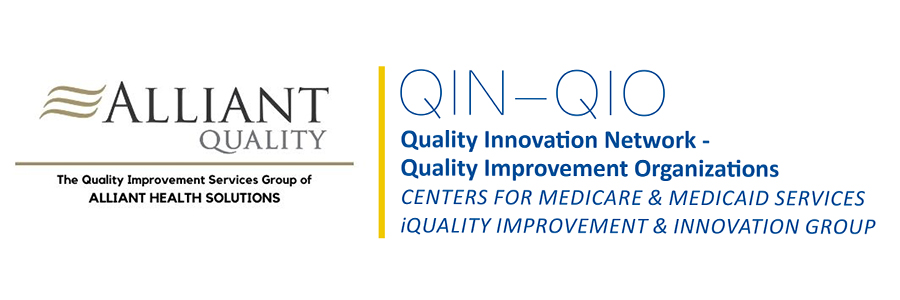 |
|
|
|
|





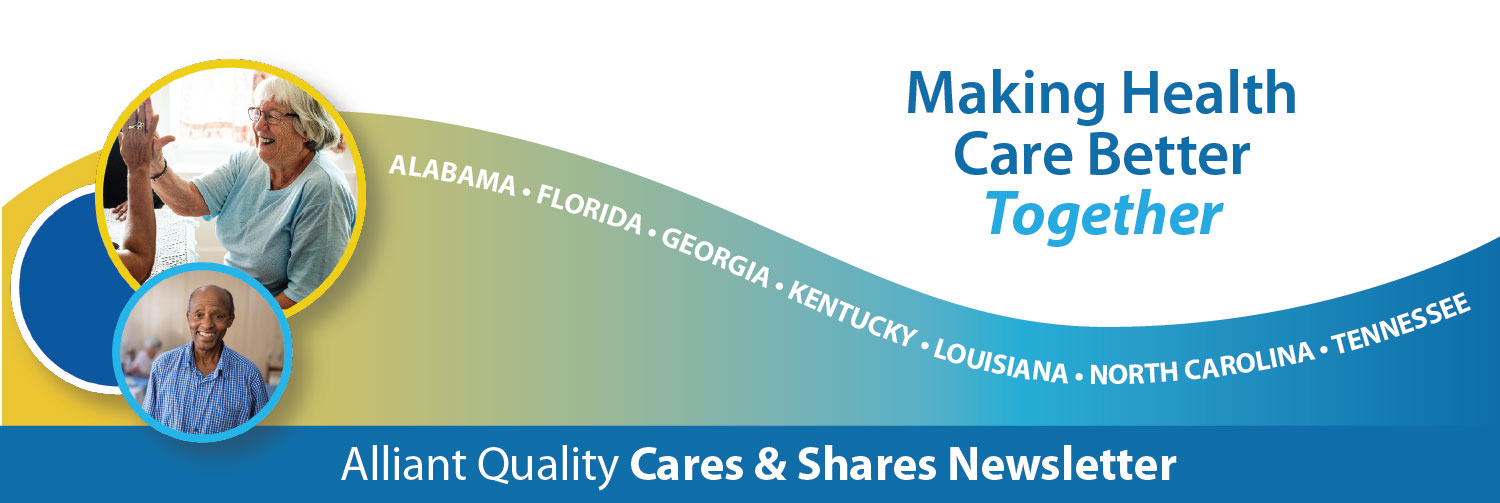








 observance will work to promote and support new evidence-based treatment and recovery practices, the emergence of a strong and proud recovery community, and the dedication of service providers and community members across the nation who make recovery in all its forms possible.
observance will work to promote and support new evidence-based treatment and recovery practices, the emergence of a strong and proud recovery community, and the dedication of service providers and community members across the nation who make recovery in all its forms possible. 




